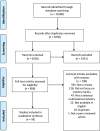Strategies to expand corporate autonomy by the tobacco, alcohol and sugar-sweetened beverage industry: a scoping review of reviews
- PMID: 35164801
- PMCID: PMC8845406
- DOI: 10.1186/s12992-022-00811-x
Strategies to expand corporate autonomy by the tobacco, alcohol and sugar-sweetened beverage industry: a scoping review of reviews
Abstract
Background: Noncommunicable diseases contribute to over 70% of global deaths each year. Efforts to address this epidemic are complicated by the presence of powerful corporate actors. Despite this, few attempts have been made to synthesize existing evidence of the strategies used to advance corporate interests across industries. Given this, our study seeks to answer the questions: 1) Is there an emergent taxonomy of strategies used by the tobacco, alcohol and sugar-sweetened beverage (SSB) industries to expand corporate autonomy? 2) How are these strategies similar and how are they different?
Methods: Under the guidance of a framework developed by Arksey and O'Malley, a scoping review was carried out whereby six databases were searched in June 2021 to identify relevant peer-reviewed literature. To be included in this review, studies had to explicitly discuss the strategies used by the tobacco, alcohol, and/or sugar-sweetened beverage multinational corporations and be considered review articles aimed to synthesize existing evidence from at least one of the three industries. Eight hundred and fifty-eight articles were selected for full review and 59 articles were retained for extraction, analysis, and categorization.
Results: Results identified six key strategies the industries used: 1) influencing government policy making and implementation, 2) challenging unfavorable science, 3) creating a positive image, 4) manipulating markets, 5) mounting legal challenges, and 6) anticipating future scenarios. Despite these similarities, there are few but important differences. Under the strategy of influencing government policy making and implementation, for example, literature showed that the alcohol and SSB industries have been "privileged with high levels of participation" within international public health organizations.
Conclusions: Understanding how industries resist efforts to control them is important for public health advocates working to reduce consumption of and death and diseases resulting from harmful commodities. Moreover, there is a greater need for the public health community to generate consensus about how to ethically engage or not engage with industries that produce unhealthy commodities. More studies are also needed to build the evidence base of industry tactics to resist regulation, particularly in the case of SSB, and in low-and middle-income countries.
Keywords: Alcohol industry; Commercial determinants of health; Corporate strategies; Noncommunicable diseases; Sugar-sweetened beverage industry; Tobacco industry.
© 2022. The Author(s).
Conflict of interest statement
The authors declare that we have no competing interests.
Similar articles
-
Nutrition related non-communicable diseases and sugar sweetened beverage policies: a landscape analysis in Zambia.Glob Health Action. 2021 Jan 1;14(1):1872172. doi: 10.1080/16549716.2021.1872172. Glob Health Action. 2021. PMID: 33876714 Free PMC article. Review.
-
Corporations' use and misuse of evidence to influence health policy: a case study of sugar-sweetened beverage taxation.Global Health. 2019 Sep 25;15(1):56. doi: 10.1186/s12992-019-0495-5. Global Health. 2019. PMID: 31551086 Free PMC article.
-
Corporate political activity in the context of sugar-sweetened beverage tax policy in the WHO European Region.Eur J Public Health. 2022 Oct 3;32(5):786-793. doi: 10.1093/eurpub/ckac117. Eur J Public Health. 2022. PMID: 36099153 Free PMC article.
-
Barriers to, and facilitators of, the adoption of a sugar sweetened beverage tax to prevent non-communicable diseases in Uganda: a policy landscape analysis.Glob Health Action. 2021 Jan 1;14(1):1892307. doi: 10.1080/16549716.2021.1892307. Glob Health Action. 2021. PMID: 33874854 Free PMC article.
-
The relationship between the price and demand of alcohol, tobacco, unhealthy food, sugar-sweetened beverages, and gambling: an umbrella review of systematic reviews.BMC Public Health. 2024 May 10;24(1):1286. doi: 10.1186/s12889-024-18599-3. BMC Public Health. 2024. PMID: 38730332 Free PMC article.
Cited by
-
Alcohol, No Ordinary Commodity: policy implications for Canada.Front Public Health. 2024 May 22;12:1335865. doi: 10.3389/fpubh.2024.1335865. eCollection 2024. Front Public Health. 2024. PMID: 38841683 Free PMC article. Review.
-
Towards a conceptual framework for the prevention of gambling-related harms: Findings from a scoping review.PLoS One. 2024 Mar 22;19(3):e0298005. doi: 10.1371/journal.pone.0298005. eCollection 2024. PLoS One. 2024. PMID: 38517885 Free PMC article.
-
Typology of how 'harmful commodity industries' interact with local governments in England: a critical interpretive synthesis.BMJ Glob Health. 2023 Jan;8(1):e010216. doi: 10.1136/bmjgh-2022-010216. BMJ Glob Health. 2023. PMID: 36690378 Free PMC article.
-
The Founder: Dispositional Greed, Showbiz, and the Commercial Determinants of Health.Int J Environ Res Public Health. 2023 Apr 23;20(9):5616. doi: 10.3390/ijerph20095616. Int J Environ Res Public Health. 2023. PMID: 37174136 Free PMC article.
-
Process evaluation of an mHealth-based school education program to reduce salt intake scaling up in China (EduSaltS): a mixed methods study using the RE-AIM framework.BMC Public Health. 2024 Aug 20;24(1):2261. doi: 10.1186/s12889-024-19732-y. BMC Public Health. 2024. PMID: 39164700 Free PMC article.
References
-
- Stevens DF. Corporate autonomy and institutional control: the crown corporation as a problem in organization design. Can Public Adm/Adm publique du Can. 1991;34:286–311. doi: 10.1111/j.1754-7121.1991.tb01464.x. - DOI
-
- Asslander MS, Roloff J. Endangering social and economic sustainability: supplier management in the automobile industry. Int J Sustain Strateg Manag. 2010;2:256. doi: 10.1504/IJSSM.2010.038300. - DOI
Publication types
MeSH terms
Grants and funding
LinkOut - more resources
Full Text Sources


